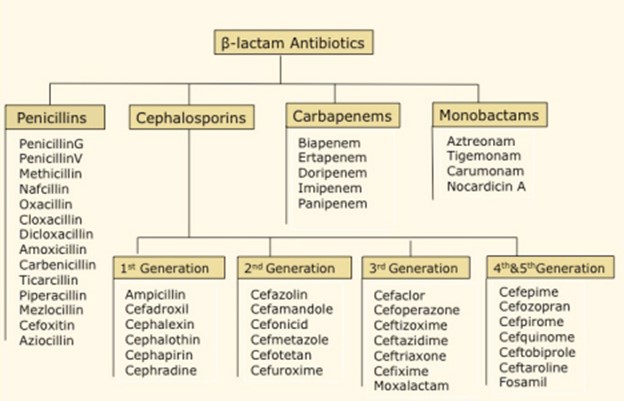An older adult is admitted to the hospital. The patient's height is 5 feet, 6 Inches (1.68M), and weigh 250 lb. (113.3kg). The nurse calculates the patient's current body mass index (BMI) as: (Round your answer to the nearest whole number.)
41.0
35.5
30.0
40.0
The Correct Answer is D
To calculate the patient's body mass index (BMI), we need to divide the weight (in kilograms) by the square of the height (in meters). Let's convert the height and weight measurements to the appropriate units and perform the calculation:
Height: 5 feet, 6 inches = 5 + (6/12) = 5.5 feet = 1.6764 meters (rounded to four decimal places) Weight: 250 lb. = 113.3 kg
BMI = Weight (kg) / (Height (m))^2
BMI = 113.3 kg / (1.6764 m)^2
BMI ≈ 40.0
Nursing Test Bank
Naxlex Comprehensive Predictor Exams
Related Questions
Correct Answer is D
Explanation
Cephalosporins are similar to another group of beta-lactam antibiotics called the Penicillins. Both cephalosporins and penicillins belong to the beta-lactam class of antibiotics, which share a similar structure and mechanism of action. They inhibit bacterial cell wall synthesis by binding to specific proteins called penicillin-binding proteins (PBPs), leading to bacterial cell death. This shared mechanism of action makes cephalosporins and penicillins similar in their antibacterial effects.
On the other hand, macrolides, fluoroquinolones, and aminoglycosides are different classes of antibiotics with distinct structures and mechanisms of action. They work through different mechanisms to inhibit bacterial growth and have different spectrums of activity compared to beta-lactam antibiotics like cephalosporins and penicillins.

Correct Answer is D
Explanation
To calculate the milliliters per hour (mL/hr) for the IV infusion, you divide the total volume (in milliliters) by the total time (in hours).
In this case, the total volume is 1 liter, which is equal to 1000 milliliters, and the total time is 6 hours.
So, you divide 1000 mL by 6 hours:
1000 mL / 6 hours = 166.67 mL/hr
Rounding off, the nurse will program the IV infusion device to infuse at approximately 167 mL/hr.
Whether you are a student looking to ace your exams or a practicing nurse seeking to enhance your expertise , our nursing education contents will empower you with the confidence and competence to make a difference in the lives of patients and become a respected leader in the healthcare field.
Visit Naxlex, invest in your future and unlock endless possibilities with our unparalleled nursing education contents today
Report Wrong Answer on the Current Question
Do you disagree with the answer? If yes, what is your expected answer? Explain.
Kindly be descriptive with the issue you are facing.
